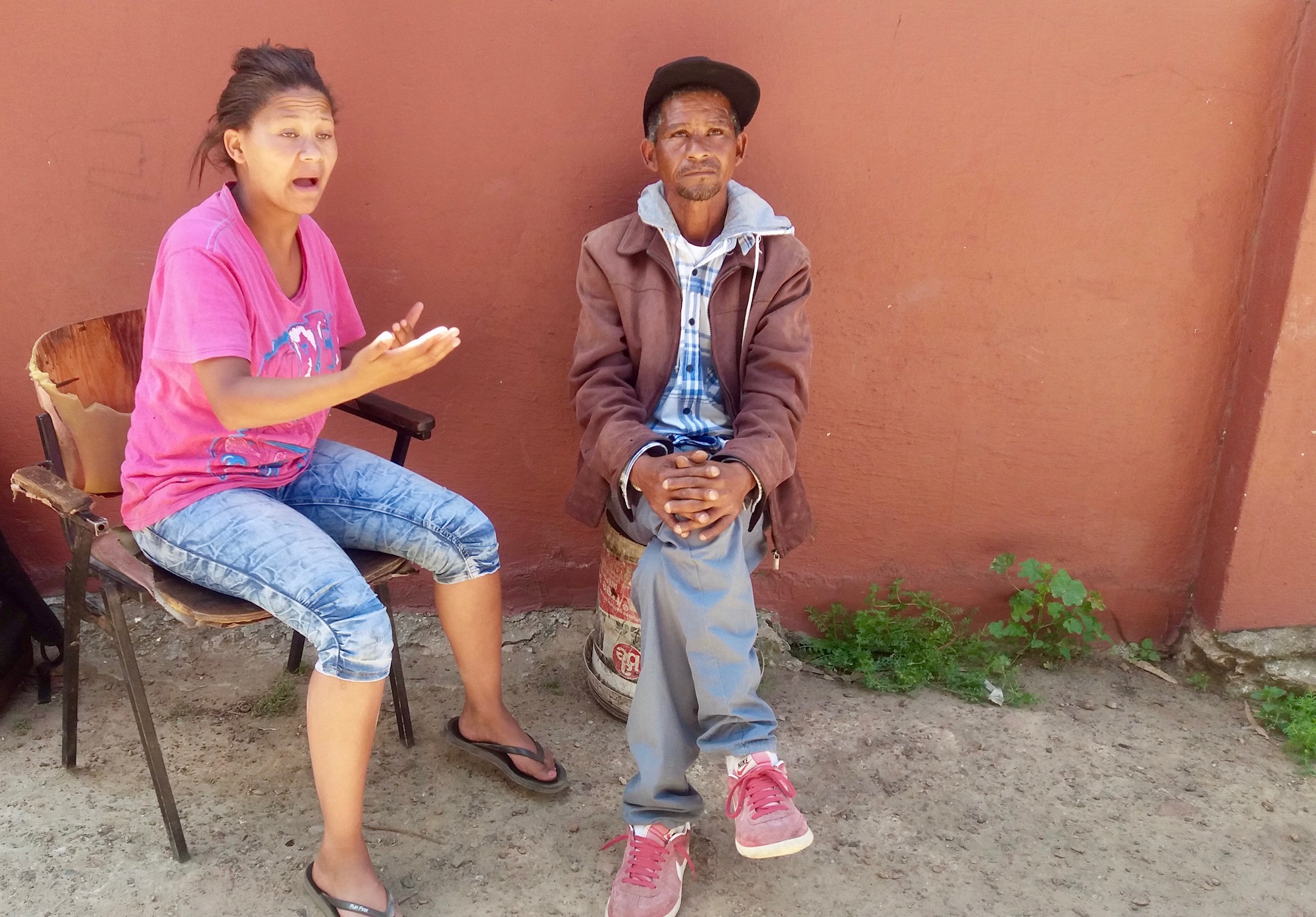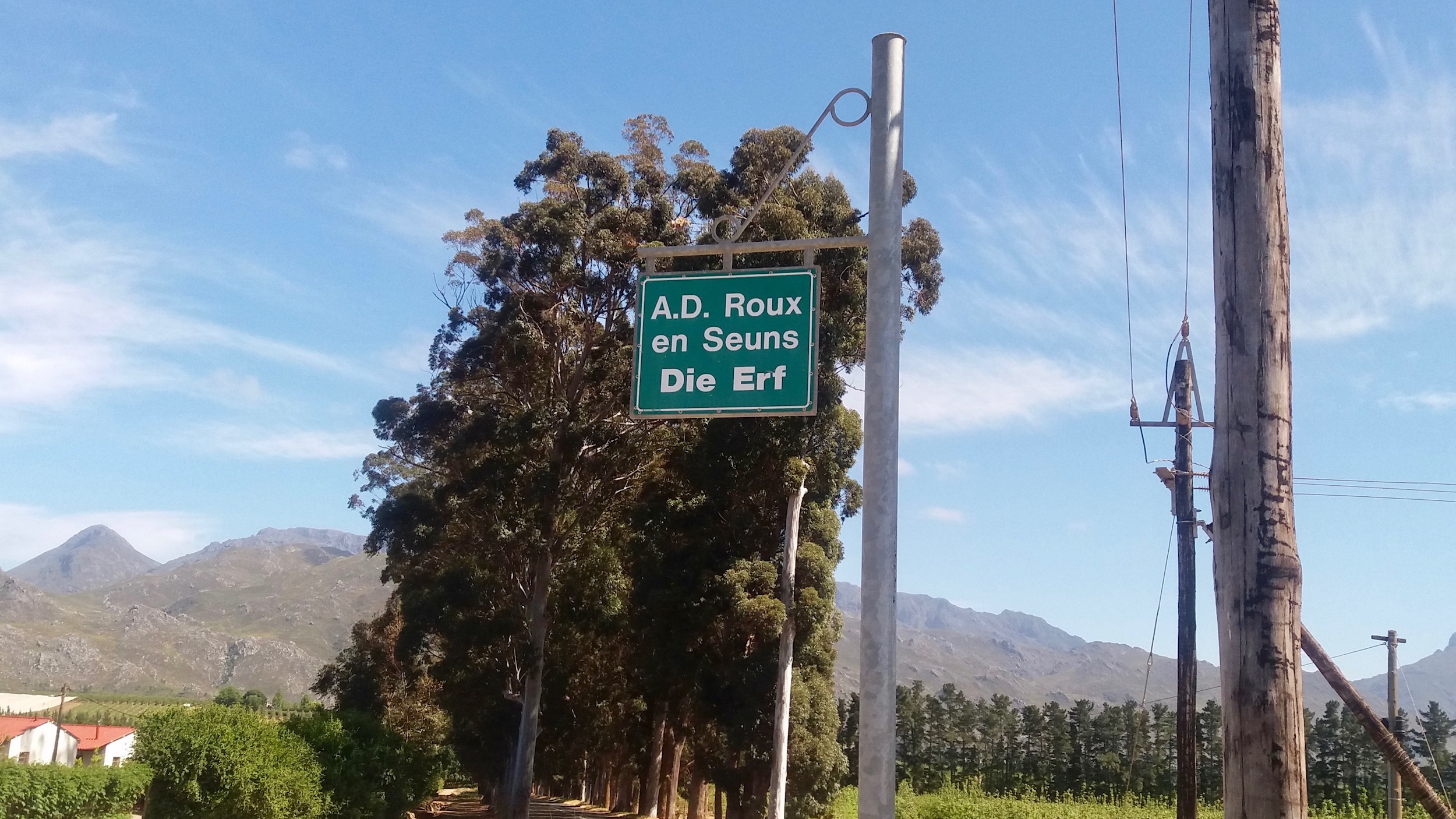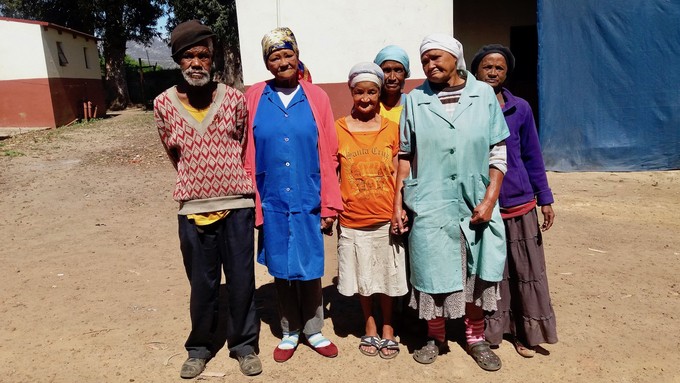Elderly farm workers face eviction
Some have worked on the Grabouw farm for more than 35 years
Six elderly people who have worked for over 35 years on Die Erf farm in Grabouw, are among eight former workers facing eviction.
The apple export farm is 65km outside Cape Town, between Villiersdorp and Grabouw. Aged between 50 and 67, the former employees started work when they were 15 years old. They performed various duties – packing, quality control, sorting, pruning and cleaning. They say they were dismissed with nothing, and told to go and claim social grants.
They say they have known their employer since he was born and they helped raise him.
The workers claim they never received any benefit from the unemployment insurance money (UIF) deducted from their wages for all these years. They also say they never received any compensation for injuries sustained at work during these years.
In an email to GroundUp, Yolandi Dippenaar, Die Erf farm’s attorney stated: “The Company is registered for UIF and Workers Compensation Assistance.”
But the Compensation Fund in Pretoria told GroundUp twice that it has no record of the farm and could not trace the registration number provided.
Jan Geland, 67, says he worked for 52 years as a general worker and a plumber on the farm. His parents originated from Ladysmith and they died while working on the farm.
He has problems with his legs which he blames on an accident on a tractor when being ferried with other farm workers to work. He was never paid compensation.
Three years ago, he was told there was no longer work for him on the farm. He was dismissed with nothing. He is still living on the farm but facing eviction. He survives on a R1,500 social grant. A mobile clinic visits the farm occasionally.
Dippenaar said: “It appears that the employees are under the impression that they would be entitled to some sort of severance pay, once they are dismissed, which is not the case in dismissals based on misconduct or incapacity. Severance pay is only payable in cases of retrenchment, as determined by labour legislation.”
On the question of eviction, Dippenaar said: “Employees are only threatened with eviction if they fail to vacate the houses on the farm after they have been dismissed and after they have received notice to do so … Right of residency on the Farm is subject to and dependant on the continuance of an employment agreement … unless of course the employee is a protected occupier as stipulated in Extension of Security of Tenure Act, Act 62 of 1997,” she said.
On the question of UIF, she said, in order to claim, a person must apply within six months of termination. “Our client can unfortunately not accept responsibility for previous employees who failed to take the necessary steps in this regard. All our client’s duties were complied with.”
Geland says life was better on the farm when the current employer’s father was still running things ten years ago.
“He was a good boss. He would give us medical aid, bonus every six months, end of the year party, Christmas bonus, Shoprite vouchers and children outings. Every Friday, all old people would finish work at 4pm and [he] accompanied [us] shopping. But when the son came in charge, he scrapped everything,” says Geland.

Fransiena Gelderblon, 62, has a doctor’s note saying she is not fit to work anymore as she is suffering from depression and high blood pressure.
“The farm owner also wanted to evict me but I refused and told him: ‘You were not yet born when I started working on this farm,’” she says.
Manteleen Pietersen, 67, says she is the third generation of her family born on Die Erf. She was ten when she and her eight sisters started sowing and reaping beans and onions. Her eldest son, who was born on the farm, is now 47.
“I worked all my life on the farm. My husband died at 75 while working as a driver. I was also involved in a tractor accident - suffered a miscarriage, broke my ribs and never got compensation. I was dismissed with nothing. I am helpless. Last year, I was diagnosed with bladder cancer,” says Pietersen.
Pietersen is a member of the South African Parastatal and Tertiary Institutions Union (SAPTU). She said they pay R35 membership fees per month. She and other elderly people sought help from the union, but she says nothing came of it.
Daniel Olyn, SAPTU representative said: “These workers were members of our organisation before, but they resigned from our union in August 2016. During the time that they were our members, I dealt with all the grievances and dealt with all the issues arising.”
“I never left any grievance or case untouched. I attended each and every hearing that was brought under my attention. I have done all in my power and according to our legislation to address all issues that were brought to my attention. As an official I also tried to uplift them by inviting them to training opportunities to enhance their rights.”
Stafaans Wagewan worked for 23 years and expected to be paid a pension after his two decades of service. He says he has lung cancer and he was dismissed with nothing.
“The employer promised to pay all people who have worked more than three years, when they finally retire.”
But, he says, he was dismissed with nothing. “My daughter, Roslyn, had to leave school, start working to help her mother financially. Every two months, I need R150 for transport to take me to Tygerberg hospital for chemotherapy,” he says.
The employer said Wagewan was not dismissed, but due to his medical condition, he was unable to continue with his work.
Dippenaar said: “The other benefits mentioned by employees were provided to the employees while the employer was in a financial position to do so. None of these benefits are contained in the employment agreement, which means that the employees are not entitled to these benefits. Although the employer would like to provide these benefits to the employees, they are currently not in a position to do so due to the current economic climate.”
The other affected workers include Pietersen’s younger sister, Sophia, Moreen Tiemie, Maria Malambi and Caroline Booysen. They all share a similar predicament, said Tiemie. “The farmer is continuously threatening me with eviction.”

Letters
Dear Editor
I am horrified to read this, and I am horrified to see the response by the lawyer of the Farm owner.
So, is Malema then so wrong for the things he is saying about the farmers?
Does the Steve Brigade and others not maybe stop for moment to think that this is the reason that there are so many farm attacks?
We as a Nation can't allow for these evictions to take place. These families, 3rd generation are also entitled to either a piece of the land which they have worked for years, or they must get generous severance packages at the end of their careers, so that they can spend their twilight years, after being Workers for so long in peace and comfort.
It is time for us as a Nation to stand up against greed like this.
© 2016 GroundUp. 
This article is licensed under a Creative Commons Attribution-NoDerivatives 4.0 International License.
You may republish this article, so long as you credit the authors and GroundUp, and do not change the text. Please include a link back to the original article.



